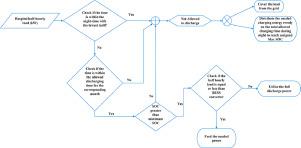Journal of Energy Storage ( IF 8.9 ) Pub Date : 2021-09-13 , DOI: 10.1016/j.est.2021.103183 Motasem Bani Mustafa 1 , Patrick Keatley 1 , Ye Huang 1 , Osaru Agbonaye 1 , Oluwasola O. Ademulegun 1 , Neil Hewitt 1

|
The ambitious target of reaching net-zero greenhouse gas emissions by 2050 in the UK, which includes the decarbonisation of heat and electricity, means the increase of instantaneous power from non-dispatchable renewable energy sources (RESs). The intermittency of RESs will cause stability issues for the grid resulting from the mismatch between generation from RES and load demand. Battery energy storage systems (BESS) can match loads with generation and can provide flexibility to the grid. This study is proposing the health sector as a new flexibility services provider for the grid through BESS. The health sector has large loads that run throughout the year, and by managing this load it can provide flexibility to the grid. Four different scenarios have been evaluated for a range of behind-the-meter (BTM) BESS for a hospital in the UK to provide arbitrage and ancillary services considering the option of installing a photovoltaic (PV) system. It was found that BESS would not be economically viable through arbitrage alone since the payback period was always greater than the BESS lifetime. However, bundling services by participating in the ancillary services market resulted in payback periods as low as 3.10 years for some systems, and the net present value (NPV) could reach more than £5 million. This work provides evidence that the health sector can be a significant player in the transition to a renewables-led energy system, an exemplar for other sectors, and one of the solutions to recovery from the COVID19 pandemic.
中文翻译:

用于医院套利及辅助服务的电池储能系统评估
英国到 2050 年实现温室气体净零排放的雄心勃勃的目标,包括热电脱碳,这意味着不可调度可再生能源 (RES) 的瞬时功率增加。可再生能源的间歇性将导致电网稳定性问题,原因是可再生能源发电与负载需求之间的不匹配。电池储能系统 (BESS) 可以将负载与发电量相匹配,并可以为电网提供灵活性。这项研究建议卫生部门通过 BESS 为电网提供新的灵活性服务提供商。卫生部门全年都有大量负载,通过管理该负载,它可以为电网提供灵活性。考虑到安装光伏 (PV) 系统的选项,已针对英国一家医院的一系列电表背后 (BTM) BESS 评估了四种不同的场景,以提供套利和辅助服务。发现 BESS 仅通过套利在经济上是不可行的,因为投资回收期总是大于 BESS 寿命。然而,通过参与辅助服务市场来捆绑服务导致某些系统的投资回收期低至 3.10 年,净现值 (NPV) 可能超过 500 万英镑。这项工作提供的证据表明,卫生部门可以成为向可再生能源主导的能源系统过渡的重要参与者,是其他部门的典范,也是从 COVID19 大流行中恢复的解决方案之一。









































 京公网安备 11010802027423号
京公网安备 11010802027423号